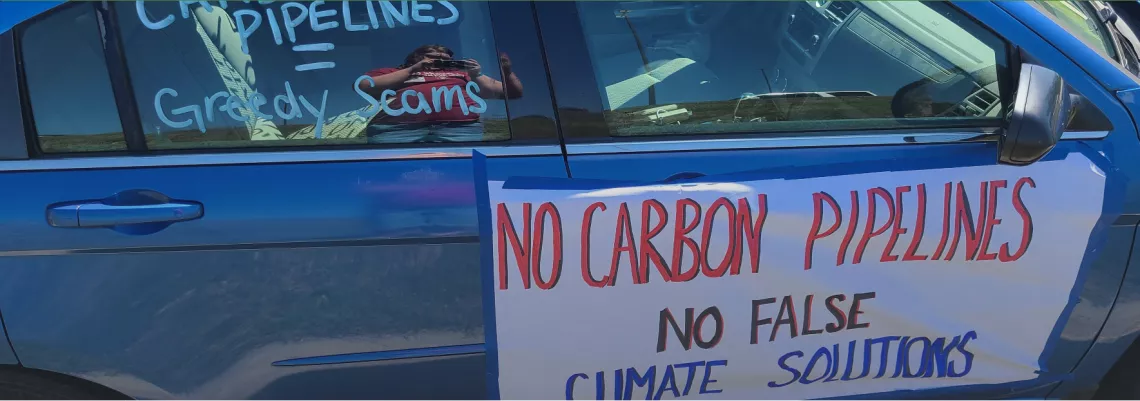
Lindsay Starck
What would you say if I told you that I’d found a way for you to continue burning through fossil fuels and to continue emitting as much carbon as you like without worrying about the impact on the atmosphere, the planet, or the future?
What if I laid out a plan to capture, transport, and store the carbon you emit in an underground vault that you’ll never have to see or think about? Or if I promised that you wouldn’t have to concern yourself anymore with climate change–the violent floods and raging fires and rising seas–and that you could carry on with life as normal, filling up those cars and boarding those planes, because I’d figured out a simple solution to make all the bad stuff go away?
You’d be skeptical. And you should be. On the surface, this sounds like the kind of climate solution we’ve all been longing for: a 2000-mile-long pipeline whimsically dubbed The Midwest Carbon Express, shuttling carbon in glittering tubes across five state lines and depositing it in geologic formations such as oil, saline, and gas reservoirs where it can be safely stored indefinitely.
The pipelines proposed by Summit Carbon Solutions, Navigator C02 Ventures, and ADM / Wolf Carbon Solutions promise such an outcome, but a surprising and powerful bipartisan alliance between farmers, Indigenous communities, and environmental advocates argues otherwise. Farmers and landowners, protective of their livelihood, are concerned about the impact on their crops (farms with pipelines running through them produce a consistently lower yield) as well as their families and their animals (carbon pipelines may leak or explode). Indigenous groups point to the disproportionate impact of industrial pollution on communities of color and argue that the pipeline will continue degrading the land rather than nourishing and restoring it. Environmental guardians fear not only the short-term impact of the pipeline but also the long-term effects of spending time and money on carbon storage rather than on strategies to reduce emissions in the first place.
Even if all of these concerns could be allayed, one major fear still looms: namely, that the companies shuttling the carbon to storage sites don’t actually intend to just store it; they intend to inject it into reservoirs in order to draw more even more oil from them (a process called enhanced oil recovery), a move that increases our use of fossil fuels rather than decreasing it. They are motivated, after all, by profit–and just storing carbon is not as profitable as using it to extract more oil.
The Sierra Club in Iowa is joining forces with allies across the political spectrum to battle legislation that would allow Summit and Navigator to seize land through eminent domain. Even though a majority of Iowans oppose the use of eminent domain to run pipelines through their land, pressure exerted on the Iowa Utilities Board by the state’s ethanol industry means that the Board may not necessarily decide in favor of that concerned majority. Some anti-pipeline advocates are worried, too, about the political connections between Summit and the Board: two of the three members were appointed by former Iowa Governor Terry Branstad (Republican), who now serves as an advisor to Summit Carbon Solutions. Last week, the Board announced that they’d make their decision in the fall, prime harvest time, when most farmers won’t be able to attend. In the meantime, the Iowa House passed a bill (HF 565) that would require 90% of landowners to agree to voluntary easements before eminent domain could be applied to the remaining 10%. Unfortunately, the bill will not make it through the Senate during the current legislative season.
Here in Minnesota, the Sierra Club is tracking several bills that could incentivize more ethanol production and also, consequently, incentivize the enhanced oil recovery industry and the construction of carbon pipelines across Minnesota. One such piece of legislation is the Gasoline “Modernization” Bill (SF 1163) authored by Democratic Senator Nick Frentz (Democrat) and others. The supporters of this bill–including the Petroleum Marketers Association, Gappa Oil Company, Northern Fuel and Convenience, and the Farm Bureau–like it because it would establish a gas tax to pay for new infrastructure designed for fuels with a higher percentage (generally 15%) of ethanol. In essence, as Republican Senator Jordan Rasmussen pointed out in the March 2 Committee Hearing, the tax is collected from consumers but used by private petroleum companies.
Members of the Sierra Club oppose this bill, as you might expect, for many reasons: First of all, the entire endeavor is founded on the assumption that ethanol is better for the environment than gasoline–yet recent research has shown that this is not the case. Second, even if ethanol were better than gasoline, if cars were fueled with 15% ethanol and 85% gasoline, we would only be marginally improving a system that we know to be environmentally destructive. Instead of spending money on infrastructure to perpetuate the current system (even if only at 85%), why not spend that money on actual clean transportation?
Third, and most important, a real clean alternative transportation system has never been more achievable: comprehensive investments in transit, walking and biking could finally be funded this year. Electrification of vehicles is already far superior to any liquid fuel and that advantage will only grow as our electricity supply gets cleaner and cleaner with more renewable and carbon-free electricity!
So, what can you do about all of this? Remind your representatives, share with your friends, tell your neighbors that although carbon capture via carbon pipelines sounds good, this strategy will create more problems than it solves.